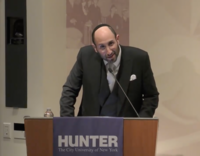On October 12th, 2023, Rabbi Dr. Meir Soloveichik, director of the Zahava and Moshael Straus Center for Torah and Western Thought, delivered a lecture on “The Yom Kippur War and the Simchat Torah War: Reflections on Fifty Years Ago and Today” in the Roosevelt House Public Policy Institute at Hunter College. Originally planned as a retrospective commemoration of the 50th anniversary of the Yom Kippur, the lecture took on a new form and heightened significance due to the ongoing situation in Israel.
Rabbi Soloveichik began by comparing the two wars from a political and military perspective, noting the uncanny similarities they shared. Both wars started on Jewish holidays with suprise attacks that occurred exactly fifty years and one day apart in the Gregorian calendar. Both wars shattered Israelis’ previous sense of security. However, Rabbi Soloveichik also pointed out an important difference. Egypt’s President Anwar Sadat launched the Yom Kippur War as part of an elaborate geopolitical strategy seeking to gain a stronger negotiating hand as he embraced an alliance with America, sought to detach himself from the Soviets, and to make peace with Israel, which he did several years later. Drawing upon insights from Henry Kissinger’s memoirs, Rabbi Soloveichik noted that “no one could ever conceive that the leader of an Arab enemy of Israel would wage war in order to wage peace.”
Hamas, on the other hand, waged war with the goal killing as many Jews as possible. As one of their leaders explicitly mentioned in an interview, Hamas “pretended to be rational” before October 7th, leading Israelis to believe that they were mostly interested in governing Gaza. Whereas the mistake of the Yom Kippur War lies in the complexity of Sadat’s calculation, the “Simchat Torah War reveals the world’s willingness to assume that a terrorist group would rather stay in its own box, pursuing its political and economic self-interest, even when it is expressly committed to the destruction of the Jewish people,” as indicated by Hamas’ charter. Rabbi Soloveichik noted that Hamas embraced unspeakable acts not known since the Nazis, except that while the Nazis “had the class to be embarrased about what they were doing, Hamas proudly posted its crimes to social media."
One lesson we should learn from the massacre is what R. Soloveichik calls the “Begin Doctrine”; as Menachem Begin once commented, “If an enemy of our people says he seeks to destroy us, believe him.” Finally, Rabbi Soloveichik connected the two wars to themes in Jewish thought. The holidays of Yom Kippur and Simchat Torah “reflect two different poles of Jewish life.” Yom Kippur represents the fragility of human existence, and 1973 was a moment of great vulnerability for Israel. Simchat Torah celebrates the joy of Jewish life, and Israelis’ inspiring resilience contrasts sharply with Hamas’ genocidal ambitions. While Hamas desires death, “We celebrate Simchat Torah because we love life.” With the new cycle of the Torah reading approaching, Rabbi Soloveichik concluded by expressing his hopes for “new beginnings in Jewish history and thereby of our own eternity.”

